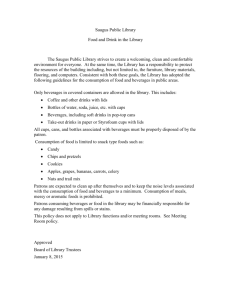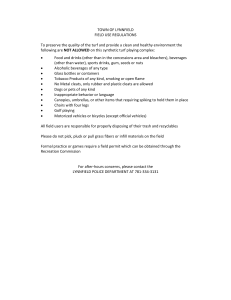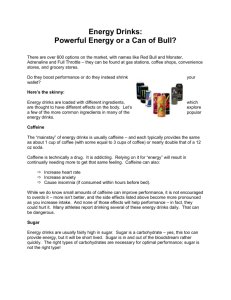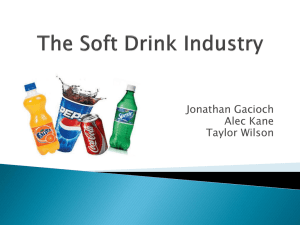Beverages in nutrition, summary of opinions
advertisement
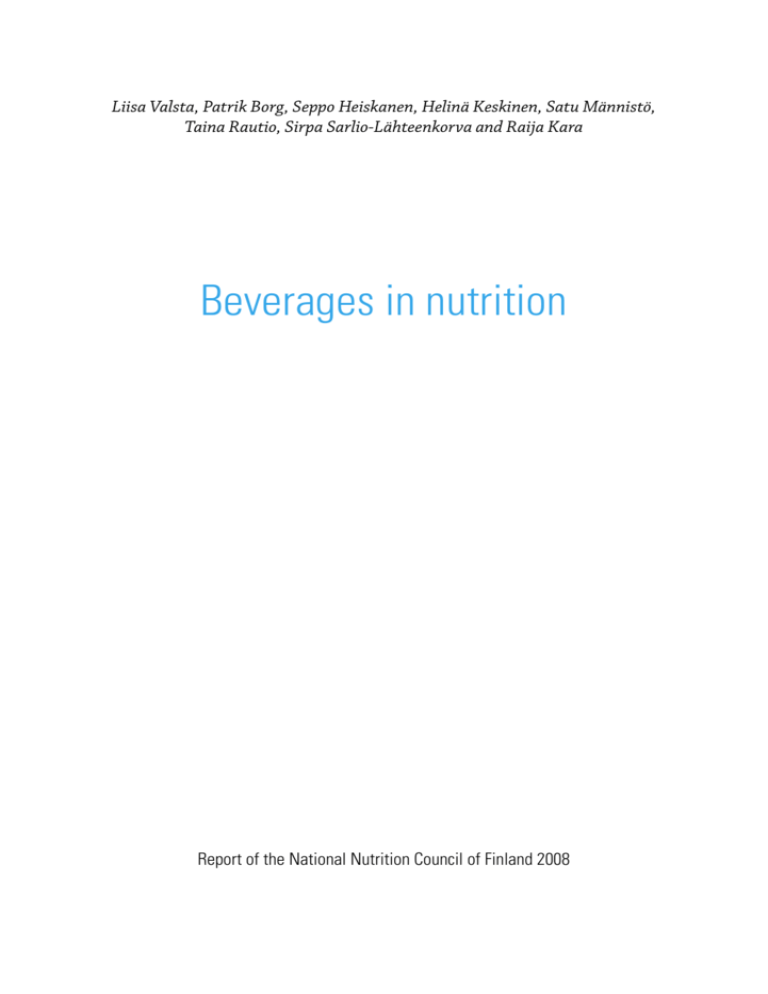
Liisa Valsta, Patrik Borg, Seppo Heiskanen, Helinä Keskinen, Satu Männistö, Taina Rautio, Sirpa Sarlio-Lähteenkorva and Raija Kara Beverages in nutrition Report of the National Nutrition Council of Finland 2008 Summary of opinions A working group appointed by the National Nutrition Council of Finland has contemplated in 2007–08 various viewpoints related to beverages. The results of the work are collected in a report that presents conclusions in the form of recommendations for the consumption of different types of beverages, complete with arguments. In the opinion of the working team, the drinking habits of Finnish people are for the time being reasonably sensible, with the exception of alcohol consumption. Drinking water is mostly of good quality in Finland, and the use of water as a thirstquenching beverage should be strongly promoted. It is important to ensure the availability of good quality drinking water also in the future. Liquid milk products have remained important beverages consumed at meals and with snacks, particularly with the popularity of fat-free alternatives having increased vigorously in the past couple of decades. People should still be encouraged to consume these products. The consumption of alcohol is a major problem in Finland. In particular, the amounts consumed by people who drink alcohol are unreasonably large. The extra energy received from alcoholic beverages is an important contributor to overweight for many people, not to mention the other health risks associated with alcohol. The large selection of beverages available on the market has increased the pressure on people to manage the consumption of the new types of beverages. According to the working group, it is important that consumers are given better possibilities to find information and to understand the composition and the intended usage of the beverages. Most beverages have a fairly low energy density (kcal or kJ/100g). However, beverages can constitute an important source of energy, because they are often consumed in large quantities which increases the risk of weight gain. The working group recommends that whole fruit juices and also other juices be diluted with water to restrict energy intake. In beverages, the factors most critical in terms of nutrition and health include energy, sugars, fat, acidity (pH, certain acids), alcohol and caffeine. The consumption frequency of beverages that contain sugar and/or certain acids plays an important part in dental health. These factors as well as the significance of beverages as sources of other nutrients are reflected in the opinions of the working group. The daily consumption of fluids, in addition to food, should be ca. 1-1.5 litres. In normal conditions this amount is adequate for almost all age groups. Only elderly people should drink more and more attention than before should be paid to their drinking habits. The intake of fluids should be based on a regular daily schedule, and beverages that contain sugar and/or acids, in particular, should preferably be consumed at meals. Repeated consumption of beverages containing sugar and/or acids is extremely detrimental to dental health. The entire daily fluid need can and should be satisfied with just water (in addition to food). In Finland, the most recommended type of water is the municipal tap water. Bottled or otherwise packaged water and mineral water can also be used, as long as they do not contain sugar and/or acids that are bad for the teeth. Carbonic acid does not cause problems. Almost all other acids do, particularly citric acid (E330). Filtered/instant coffee and tea can be consumed daily, preferably without sugar and cream. However, it can be advisable for persons who are sensitive to caffeine, as well as pregnant women and children to restrict the consumption of coffee to 0-3 cups a day to avoid the potential side effects caused by caffeine. Unflavoured fat-free and low fat (max. 1% fat) milk and sour milk are beverages that can be recommend for consumption at meals and with snacks on a daily basis. The recommended amount is ca. 5 dl a day. This includes also flavoured liquid milk products, but they are not recommended for daily consumption. Soy, oat and rice drinks can be used in addition to or instead of milk products. These should also preferably be unflavoured. Whole fruit juices and nectars can be consumed at meals, about 1-2 dl per day, but they are not suited for quenching thirst or to replace fruit. Other types of juices are not recommended as daily thirst-quenching beverages, either. Energy-containing sodas are not part of a healthy diet because they contain a large amount of energy, sugar, and acids, and cola drinks also caffeine, but not other nutrients. Non-energy-containing sodas and other beverages (light drinks) are preferable over the energy-containing alternatives, but they should also be used quite infrequently due to the tooth decaying acids, which almost all of them contain. Energy drinks, sports drinks and wellbeing drinks are not designed for quenching thirst. They are hardly any different from sugar-containing or non-sugar-containing sodas. Energy drinks are not recommended for pregnant women and children, and sports drinks are only needed in special cases during and/or after prolonged physical exercise. The nutrition recommendations of the National Nutrition Council regarding alcohol consumption are still valid. The maximum daily alcohol consumption is 1 portion (10 g of ethanol) for women and 2 portions (20 g of ethanol) for men. Pregnant women, young people and children should not consume alcohol at all. Account should also be taken of the sugars and acids that wines, ciders and long drinks contain. Frequent consumption of these beverages can also be detrimental to teeth, due to the acidity of the drinks. GENERAL DRINKING RECOMMENDATIONS • 1–1.5 litres of fluids need to be consumed daily, preferably water. This amount is adequate for almost all age groups in normal conditions, with the exception of nursing mothers. • In special conditions, such as in hot weather or if running a temperature, the need for fluids may increase. • Elderly people should consume more fluids than others, because of the decreased capacity of their kidneys to concentrate urine. • Drinking as well as eating should follow a regular daily schedule. Beverages that contain sugar and/or acids are best consumed at meals to keep the frequency of their consumption moderate. The preferred beverages between meals and snacks include water, unflavoured mineral water as well as coffee and tea without sugar Water • Arguments for the opinions: fluid need, non-energy-containing, microbiological and chemical quality • The entire daily fluid need can and should be satisfied with just water (in addition to food) • No fluid intake is required during physical exercise unless the exercise continues for more than one hour. In that case water is the recommended fluid. • In normal conditions it is very rarely necessary to consume more than 2–3 litres of water during the day. Excessive consumption of water can even have adverse effects. • Municipal tap water is of good quality in Finland and is the recommended type of drinking water. Bottled water and water in dispensers is safe but may contain more bacteria (not pathogenic, however) than normal tap water. • Unflavoured and flavoured packaged water can be used provided it does not contain sugar and/or tooth decaying acids (citric, phosphoric, malic, tartaric and acetic acid). Coffee and tea • Arguments for the opinions: caffeine, energy, sugar, fat • Tea and filtered/instant coffee can be consumed daily, preferably without sugar and cream. Excessive consumption of coffee may cause stomach upset and sleeping problems. • Even small amounts of caffeine may cause e.g. palpitation and tremor in persons sensitive to caffeine, pregnant women and children. The daily intake of caffeine should not exceed 300 mg (ca. 3 cups) for pregnant women and for children the maximum daily amount of caffeine is 2.5 mg/kg of body weight (less than 1 cup a day for a child weighing 30 kg) • With special coffees and teas attention should be paid to the other ingredients that they contain, such as sugar, milk type and cream, as these can considerably increase the energy content of these beverages. • Persons with high cholesterol should not consume large amounts of unfiltered coffee on a daily basis (boiled or espresso type coffee) Unflavoured liquid milk products • Arguments for the opinions: energy, fat • Fat-free and low fat (max 1%) milk and milk drinks as well as sour milk are recommended beverages at meals and with snacks on a daily basis, particularly because they contain protein, calcium and vitamin D • The recommended daily intake is ca. 0.5 litres. This includes also yoghurts, curd milk, etc. • Liquid milk products with a higher fat content are not recommended for daily consumption because they contribute to a higher intake of energy and saturated fat. Flavoured liquid milk products • Arguments for the opinions: energy, sugar, fat, acids • Not recommended for regular daily consumption • The consumption frequency and amount should be low due to the sugar and fat contained in these products Soy, rice and oat drinks • Arguments for the opinions: energy, sugar • Can be used instead of milk, preferably unflavoured products Whole fruit juices and nectars • Arguments for the opinions: energy, sugar, acids • Not suited as thirst-quenching drinks and do not replace fruit • 1–2 dl of whole fruit juice can be consumed daily, preferably at meals • Dilution is recommended to reduce energy content • The daily consumption frequency of these drinks must be low due to the sugar and acids that they contain. Other juices • Arguments for the opinions: energy, sugar, acids • Not suited for daily consumption as thirst-quenching drinks • The consumption frequency must be low due to the sugar and acids that juices contain. Energy-containing sodas • Arguments for the opinions: energy, sugar, acids, and caffeine in cola drinks • Not part of a healthy diet • Sugar-containing sodas easily increase energy intake • The consumption frequency must be low due to the sugar and acids that sodas contain • Persons sensitive to caffeine, as well as pregnant women and children are advised to restrict the consumption of cola drinks. Non-energy-containing sodas and juice drinks • Arguments for the opinions: acids, caffeine in cola drinks • Preferable over energy-containing drinks but the daily consumption frequency should be low due to the acids that these drinks contain • Persons sensitive to caffeine, as well as pregnant women and children are advised to restrict the consumption of cola drinks. Energy, sports and wellbeing drinks • Arguments for the opinions: energy (not in light versions), sugar (not in light versions), acids, caffeine • Energy drinks that contain sugar are hardly any different from normal sodas and are not part of a healthy diet • Pregnant women and children should not consume energy drinks at all due to their caffeine content • The consumption of sports drinks is only justified in special conditions and for special groups = prolonged intensive physical exercise • Wellbeing drinks are not suited as thirst-quenching beverages • The consumption frequency of non-energy-containing drinks must be low due to the acids that they contain • Arguments for the opinions: energy, alcohol, sugar and acids in certain products • The maximum daily consumption of alcohol is 1 portion (10 g of ethanol) for women and 2 portions for men (20 g of ethanol) • Alcoholic beverages easily increase energy intake considerably • The acids of wines, ciders and long drinks can be detrimental to dental health if consumed frequently • Pregnant and nursing women as well as children and young persons are advised not to consume any alcohol at all. Alcoholic beverages PROPOSALS FOR ACTION AND FURTHER COMMENTS BY WORKING GROUP • A recommended daily or weekly consumption limit for energy-containing beverages should be defined • A labelling symbol should be developed that indicates the favourable or adverse effects of the beverage on dental health • Labelling should be developed so as to better enable the consumer to obtain information about the energy content of beverages • The operators in the field of health promotion (child and maternity welfare clinics, schools, health care, sports clubs, etc.) should be provided with more information about beverages • The selection of small beverage containers should be increased • Easy access to good quality drinking water (= tap water) in day care facilities, schools, work places, sports facilities, etc. should be ensured • Quality control should be increased/secured at water plants • Sodas, energy drinks, sports drinks and other beverages containing sugar and/or acids should not be on offer/for sale in schools, as they do not support the educational principles of schools • The selection of health-promoting beverages should be increased in vending machines in other locations • The planning and monitoring of the hydration management of elderly people should be included in care plans • Elderly people, their families and people caring for the elderly should be provided with more information about adequate hydration and means to implement it • The importance of abstinence and moderate alcohol consumption should be further emphasised in health education.
